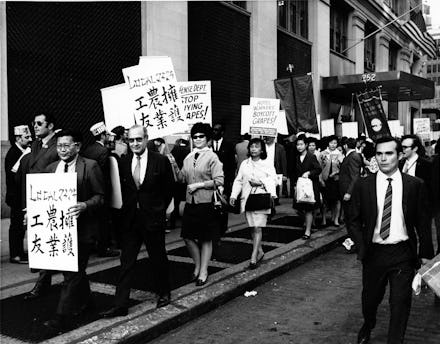#NotYourAsianSidekick Isn't the End Of the Conversation

Last week, 23-year-old freelance writer and activist Suey Park ignited a massive Twitter conversation on Asian-American feminism with the hashtag #NotYourAsianSidekick. The purpose of the hashtag, as Park explained, was to enable Asian-Americans to publicly share their stories.
At first, the discussion focused on the oppressive patriarchy that exists in Asian-American communities, and the exclusive nature of white feminism.
Soon, the hashtag spurred a broader talk about various Asian-American struggles.
Unfortunately, what began as a tool of empowerment for Asian-American feminists has since turned into what seems like an unnecessary blame-game. In the hours following Park's first set of Tweets, some white Twitter users accused Park and her fellow activists of misappropriating blame and spreading racial intolerance toward whites.
In response, Park accused her critics of trying to derail the conversation.
Before I continue, let me be clear. I am not giving a free pass to anyone who has antagonized or discriminated against Asian-Americans.
In the fight for racial equality, our voices often go unheard, in part because many believe that we all come from privileged backgrounds. What Park sparked with #NotYourAsianSidekick — a conversation drawing attention to the difficulties faced by a marginalized community — is absolutely necessary.
But the dialogue started by #NotYourAsianSidekick has, from time to time, taken what I call the "Louis Farrakhan approach." As the leader of the Nation of Islam, Farrakhan has drawn criticism from organizations like the Southern Poverty Law Center and the Anti-Defamation League for his seemingly anti-Semitic remarks; he frames the struggle for racial equality in terms of a common enemy.
Similarly, Park and some other activists have largely framed the Asian-American struggle as a byproduct of white privilege and white ignorance, without always providing historical or social context for these claims.
Using "white" as a blanket term is overly general, deliberately ignores the transgressions of members of other ethnic groups which may have also perpetuated Asian-American stereotypes, and overlooks the discrimination that Asian-Americans face in spaces that are not predominantly white, like professional basketball or mainstream hip-hop.
This tactic further fails to hold some members of the Asian-American community accountable for perpetuating (or being indifferent to) stereotypes that advocates like Park try to fight. Last week, for example, I came across Josh Kwon’s six-second Vine video mocking how Asian people wake up in the morning. Kwon squints and purposely runs into a door, suggesting that Asians cannot see properly due to the shape of their eyelids. And that's OK, somehow?
When I first raised this issue of wrongfully generalizing racial communities on Twitter with an anonymous user last week, I was told that Park and some other Asian-American advocates were right to speak in such broad terms.
Still, as Andrea Garcia-Vargas pointed out in another conversation last week, this approach can alienate those who don’t realize that these generalizations are not a condemnation of them specifically.
While I agree with her point here, to my mind racial generalizations can also deepen a set of divides that have, for so long, put Asian-Americans at a disadvantage in all facets of American society. Personally, I believe that any conversation about the Asian-American identity or Asian-American struggle should not be limited to the relationship between Asian-Americans and a particular race.
Park’s effort certainly deserves recognition, but attacking particular racial groups does little to build our collective understanding of Asian-American identities. Instead, I hope we choose to focus on telling stories that haven’t been heard yet. Only then will our voices be taken seriously.